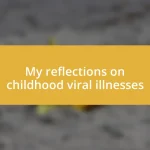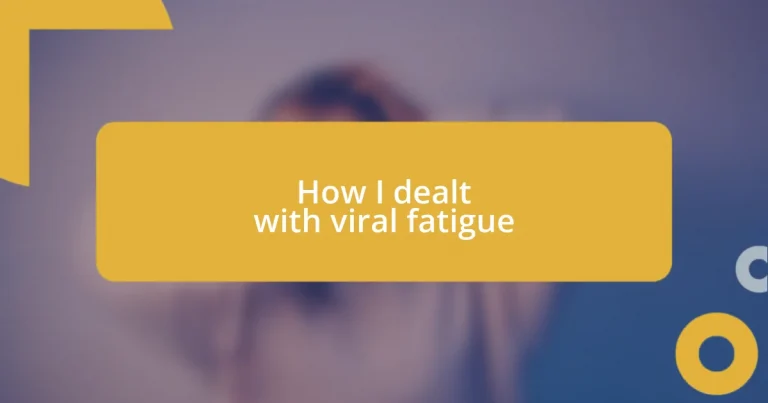Key takeaways:
- Viral fatigue encompasses emotional and psychological exhaustion from constant exposure to stressful news, highlighting the importance of breaks and mindfulness.
- Recognizing symptoms such as constant fatigue, irritability, and decreased motivation is crucial for addressing viral fatigue and reclaiming mental well-being.
- Incorporating lifestyle changes, such as physical activity, dietary adjustments, and professional help, can significantly enhance resilience and emotional health.
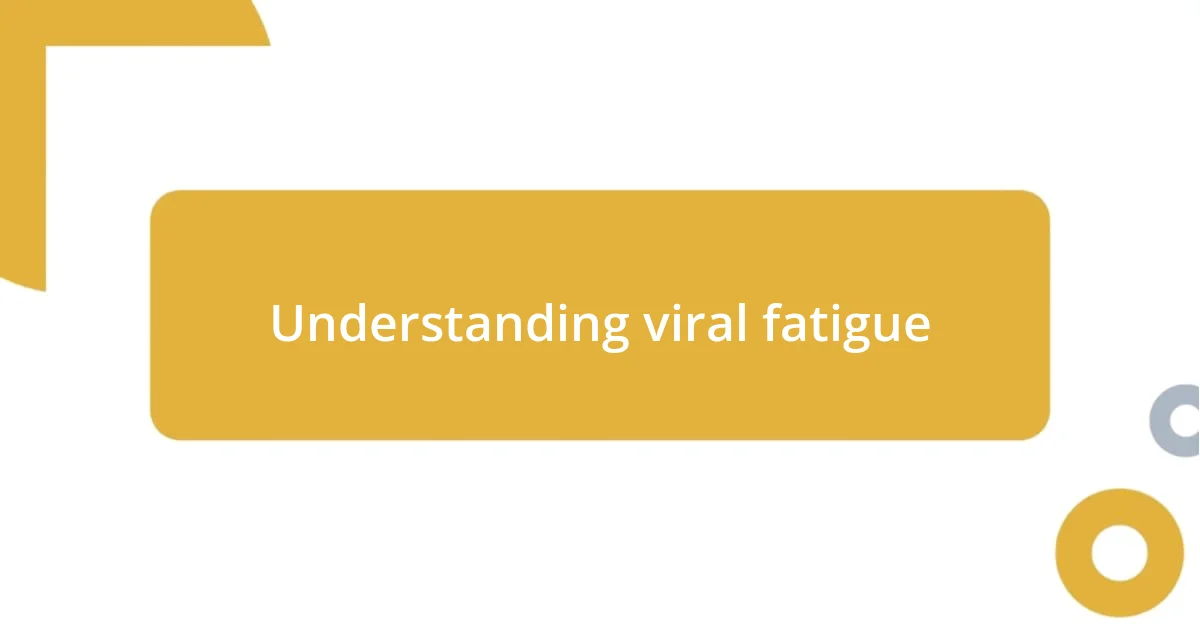
Understanding viral fatigue
Understanding viral fatigue often requires delving into our emotional and psychological responses to prolonged exposure to stressful news. I remember feeling overwhelmed by constant updates and social media notifications; it was as though I was living in a loop of anxiety. Have you ever found yourself scrolling endlessly on your phone, feeling a mix of dread and curiosity about what the next headline would bring?
It’s fascinating to think about how our brains react to such relentless input. I found that my ability to focus diminished dramatically—simple tasks became monumental challenges. This wasn’t just about being tired; it felt like a mental fog settling in, and I began to question whether this was a common experience. Many probably wonder: how can we remain informed without feeling drained?
The reality is that viral fatigue isn’t just physical; it’s deeply emotional too. Each headline can trigger a wave of fear or uncertainty, leading to a feeling of exhaustion that creeps into our daily lives. I often remind myself to take breaks and practice mindfulness, allowing moments of peace amidst the chaos. Have you tried disconnecting for a day or two? It can be a game changer.
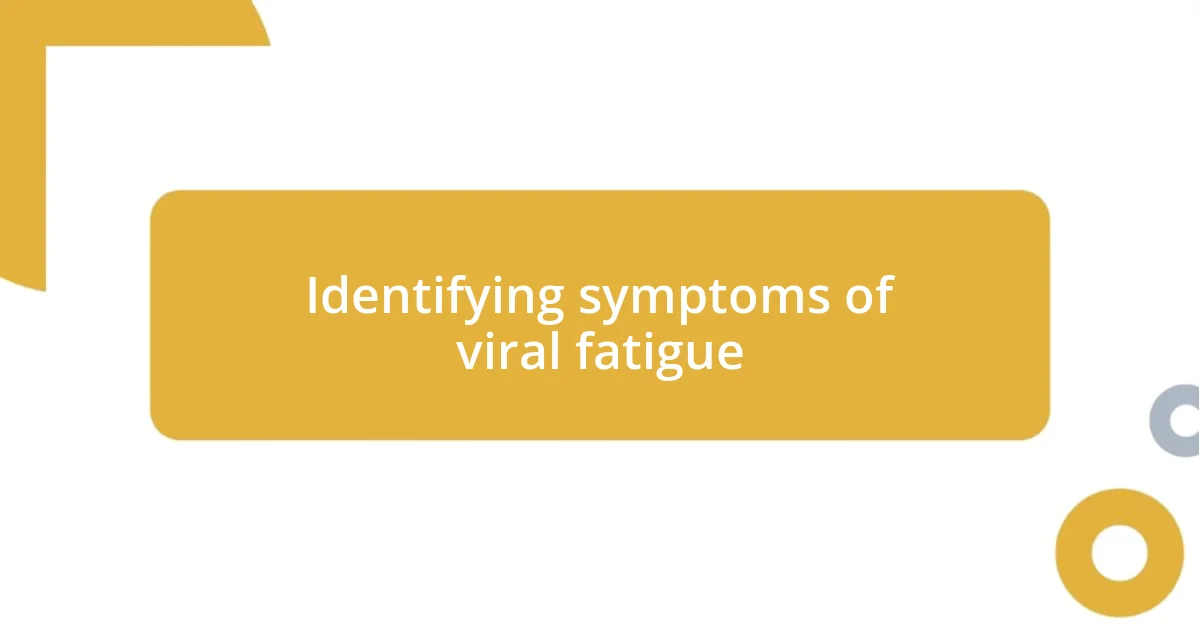
Identifying symptoms of viral fatigue
Recognizing the symptoms of viral fatigue can be tricky, especially when you’re caught up in the whirlwind of information. For me, it started with a sense of emotional heaviness that seemed to linger throughout my day. I recall sitting down for a cozy evening with a book, only to find myself unable to concentrate, my mind wandering back to news alerts I had recently read. It’s as if that mental fog had wrapped itself around me, making it hard to retain focus or even enjoy the simple things.
Some common symptoms I noticed, which could resonate with you, include:
- Constant fatigue: Feeling tired even after a full night’s sleep.
- Irritability: Short fuse over trivial matters.
- Decreased motivation: Tasks that once excited you now feel burdensome.
- Physical symptoms: Headaches or tension in your body that have no clear cause.
- Restlessness: A constant urge to check for updates, yet feeling overwhelmed by the flood of information.
Being in tune with these signs is essential, as they can guide us towards finding the necessary balance and reclaiming our mental space. I often remind myself to listen to my body and mind; they usually know when it’s time to step back.
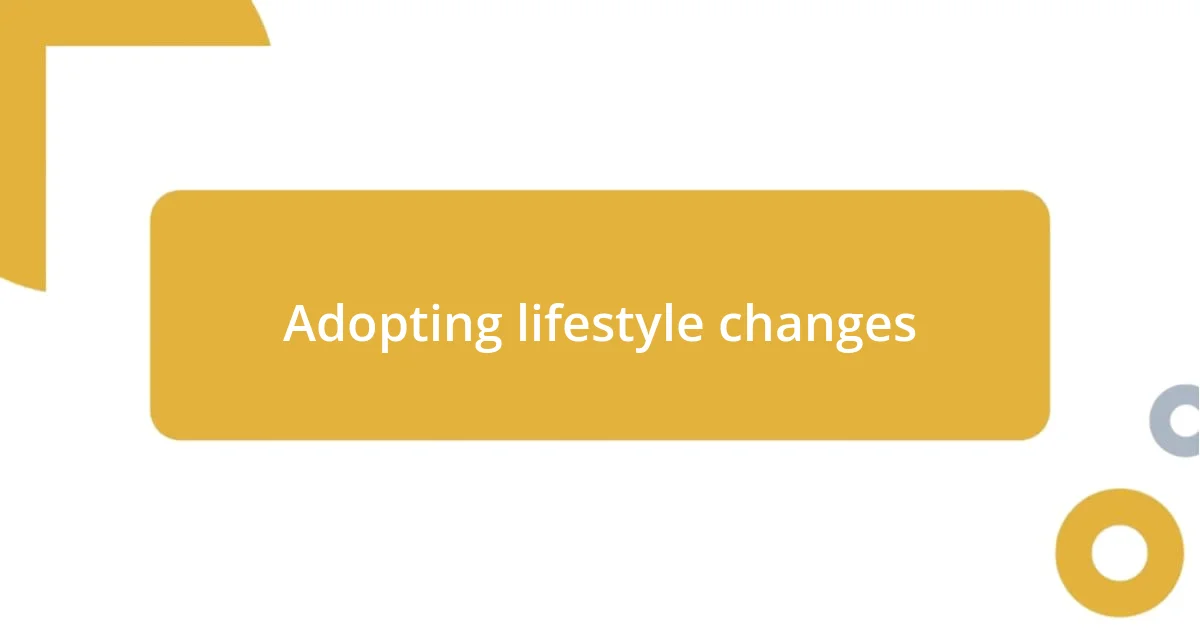
Adopting lifestyle changes
Adopting lifestyle changes has been pivotal for me in navigating viral fatigue. I started prioritizing physical activity, which surprisingly lifted my spirits. One day, I decided to try a brisk walk in nature instead of scrolling through my phone during lunch. That 30 minutes outdoors not only cleared my head but also reconnected me with the world outside the chaos. It reminded me of the simple joys that often get overshadowed in hectic times.
Incorporating routine breaks into my day became a game changer. I remember setting a timer to remind myself to step away from the screen every hour. During those breaks, I would stretch, hydrate, or even do a short meditation. This practice made a remarkable difference, helping me regain focus and recharge my mind. Have you ever noticed how a stretch or a breath of fresh air can reinvigorate your day?
Moreover, I found that re-evaluating my media consumption was crucial. I limited my news intake to once or twice a day instead of hourly updates. This shift felt liberating; the constant stream of disturbing headlines was no longer a backdrop to my life. It turns out that curating the information I consumed boosted my emotional well-being significantly. It was a lesson in finding balance, and one that I hope resonates with you.
| Lifestyle Change | Benefits |
|---|---|
| Physical Activity | Boosts mood and reduces stress |
| Regular Breaks | Improves focus and prevents burnout |
| Media Consumption | Reduces anxiety, enhances emotional well-being |
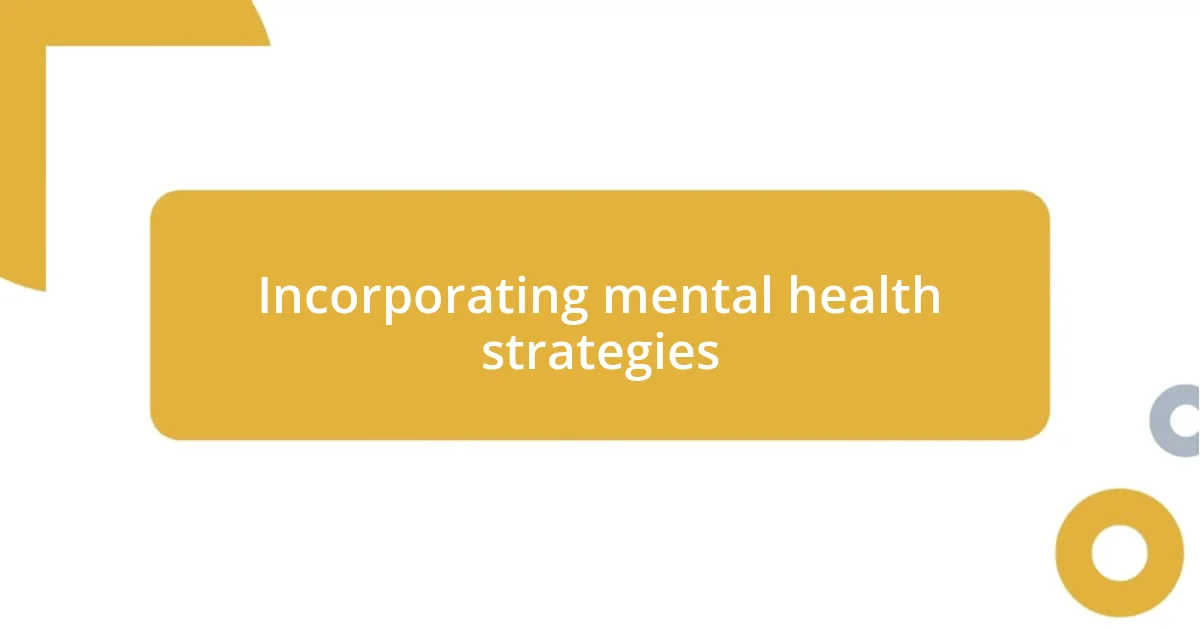
Incorporating mental health strategies
In my journey toward better mental health, I found that incorporating structured mindfulness practices made a significant difference. Most days, I set aside just ten minutes to practice deep breathing or guided meditation. Those moments felt like a serene island amidst all the noise, allowing me to reconnect with my inner self. Have you ever experienced that sudden shift in perspective after a few deep breaths? It’s remarkable how something so simple can ground us.
Another strategy I embraced was journaling, which became my outlet for processing emotions. I remember one evening, feeling overwhelmed after a long day, I poured my thoughts onto paper. By writing down my worries, I externalized the weight I had been carrying. It was almost cathartic! I often wondered how many of us hold onto our feelings instead of letting them flow. It turns out that sharing my fears on paper often lightened my emotional load, granting me clarity.
Social connections were equally vital in navigating my mental health during viral fatigue. I made a conscious choice to reach out to friends and family, sharing not only my experiences but also listening to theirs. It reminded me how important it is to feel supported and to support others. I recall a late-night conversation with a friend who was feeling similarly drained; we laughed and vented about our struggles, realizing we were not alone. Have you taken the time to check in with loved ones lately? Sometimes, a heartfelt chat can spark a shift in perspective and uplift our spirits remarkably.
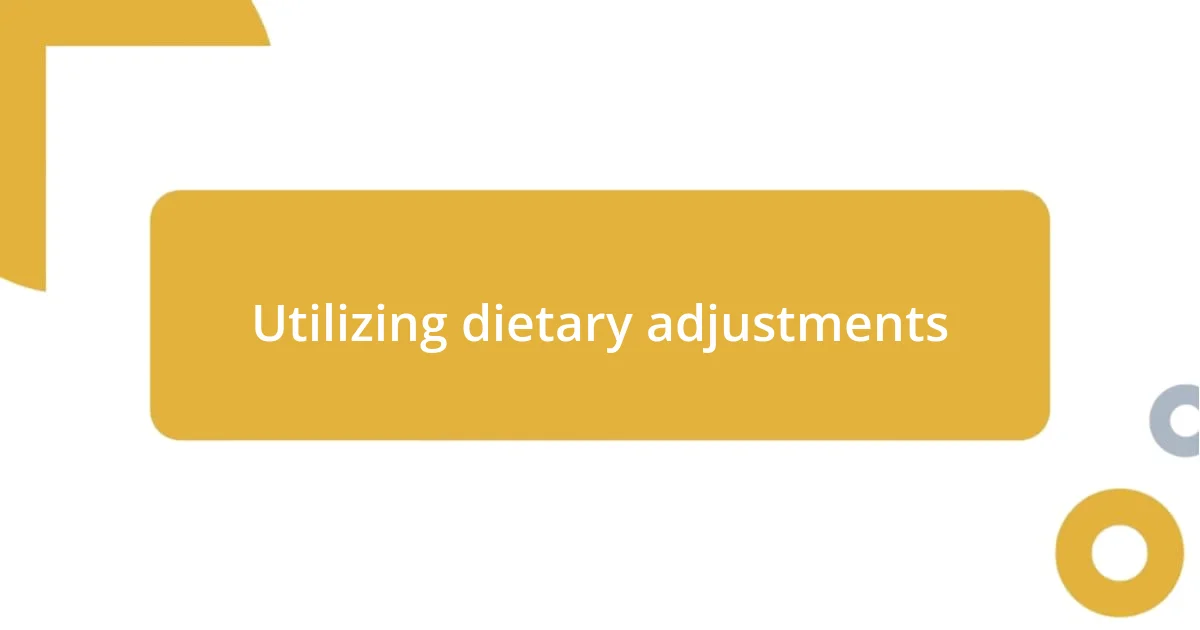
Utilizing dietary adjustments
Utilizing dietary adjustments has been a surprising yet effective strategy for combating viral fatigue. I decided to overhaul my eating habits, focusing on whole foods like fruits, vegetables, and lean proteins. I still remember the day I swapped my usual processed snack with a bowl of mixed berries. The burst of natural sweetness not only felt refreshing but also energized me in a way that sugary treats never did. Have you ever noticed how what you eat can change your mood and energy levels?
Furthermore, I started incorporating more anti-inflammatory foods into my diet, like turmeric and omega-3-rich salmon. I recall the first time I made a cozy turmeric latte; the warm, spicy drink wrapped me in comfort. It became a ritual that lifted my spirits during those overwhelming moments. What surprises me is how a simple shift in ingredients can nourish not just our bodies, but our overall well-being, enhancing mental clarity and resilience.
Finally, I paid attention to my hydration levels, making sure to drink plenty of water throughout the day. I remember when I set a daily goal to drink a certain number of glasses, and I actually felt a noticeable difference. I was less fatigued and more focused, even on the days when my energy felt low. Have you ever realized how just staying hydrated can be a game-changer? These dietary tweaks weren’t just about food; they became a foundational part of my approach to handling the fatigue that seemed to overshadow everything else.
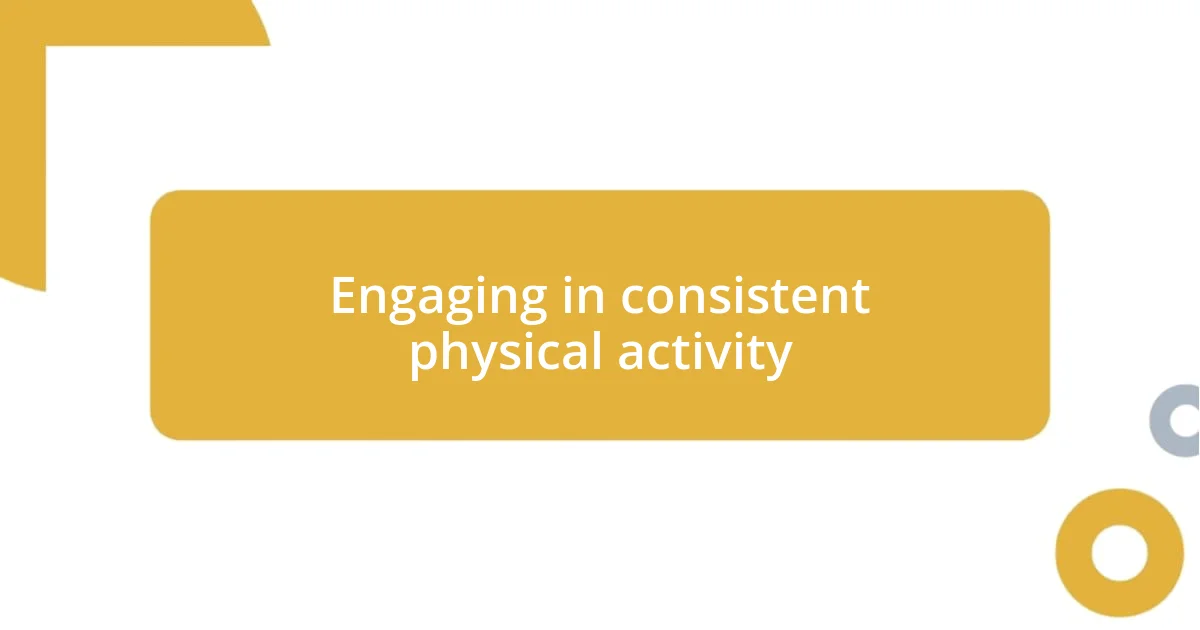
Engaging in consistent physical activity
Engaging in consistent physical activity turned out to be a powerful antidote to the fatigue I frequently felt. I remember a day when I laced up my sneakers, feeling particularly drained, yet after just a brisk walk around the neighborhood, I returned home invigorated. Have you ever experienced that burst of energy just from moving your body? It’s fascinating how a simple act like walking can uplift our mood and clear our minds.
I also discovered the joy of starting a home workout routine. I chose activities I genuinely enjoyed, like yoga and dance, which made it feel less like a chore and more like a celebration. There were days when I felt resistance creeping in, but I reminded myself of that satisfying post-workout glow. Have you thought about how engaging in movement can also be a joyful experience rather than merely a task? In my case, those moments became cherished rituals, transforming the fatigue into feelings of empowerment.
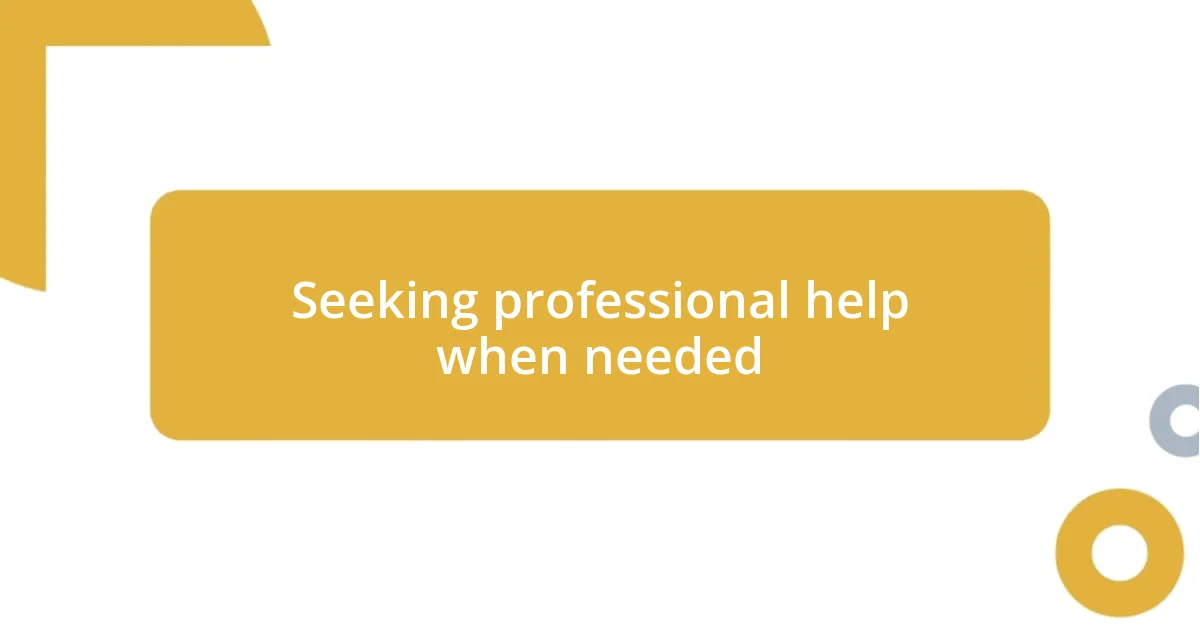
Seeking professional help when needed
Sometimes, the weight of viral fatigue feels so heavy that reaching out for professional help becomes essential. I remember feeling overwhelmed one particular week when simple tasks felt monumental. After a long session of trying to face it alone, I decided to schedule a session with a therapist. That experience was eye-opening; it was comforting to acknowledge that seeking help is a strength, not a weakness. Have you ever considered how talking to someone could lighten your load?
When navigating the complexities of fatigue, I found that professionals can equip you with tools tailored to your situation. My therapist introduced me to mindfulness techniques that I wasn’t aware of before, and let me tell you, they transformed my approach to daily stressors. Have you ever thought about how a simple breathing exercise might shift your entire outlook? In moments when I felt my energy slipping, I discovered that just a five-minute pause to center myself could make a world of difference.
Additionally, that professional insight reassured me that I wasn’t alone in my experience. During support group sessions, hearing others share their struggles not only validated my feelings but also fostered a sense of community. It struck me how sharing our stories can create connections that uplift us. Isn’t it comforting to know that there’s a network of understanding out there just waiting to embrace you? Seeking professional help can be a vital step towards not just recovery but also growth.









